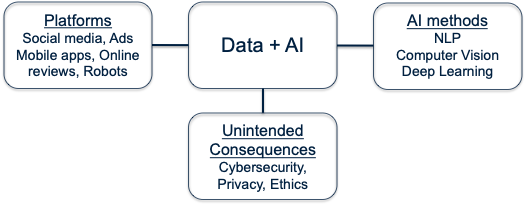Welcome to the Data + AI Research Group!
Our research group conducts exciting research on data analytics and AI.

With the advent of data-intensive platforms (e.g., social media, mobile, e-commerce, videos, robots), we are witnessing unprecedented data capturing of consumer behaviors, business operations, and societal dynamics. Recent advances in AI (e.g., natural language processing, machine learning, computer vision, deep learning, and generative AI) and the availability of computational resources (e.g., GPUs, cloud computing) allow us to effectively and efficiently analyze big data, uncover business insights, and make data-driven decisions. This new phenomenon of business analytics creates opportunities and challenges for academic researchers and industry practitioners. Our research aims to advance business analytics using AI approaches, creating new theoretical knowledge and business value from big data (especially unstructured data).
Recently, our research group has been examining how AI reshapes firms, labor, and institutions by highlighting the dual forces of efficiency gains and integrity risks. Across contexts such as auditing, journalism, video platforms, clinical trials, restaurants, labor unions, and firm strategy, we show that AI adoption is not monolithic: its impacts depend on whether it is product- or process-oriented, partial or full, embodied or disembodied. Using empirical designs such as difference-in-differences, long-difference models, multimodal analysis, and field interviews, we find that AI boosts productivity, output, and firm value, but can erode trust, displace workers, and compromise information quality unless mediated by governance, institutional oversight, and strategic orientation. Collectively, our work advances a unified theory of the efficiency–integrity frontier of AI adoption, demonstrating that value realization requires complementary investments, institutional safeguards, and human–AI collaboration mechanisms.
The main contributions are:
- To develop novel data analytics methods and frameworks:
- To study data-intensive platforms using analytics:
- To examine the economic and societal impacts of AI and IT in business and society: